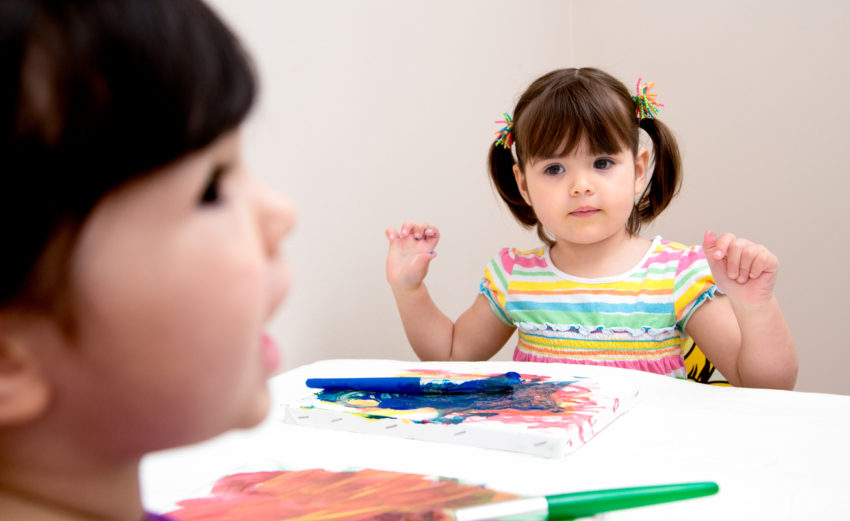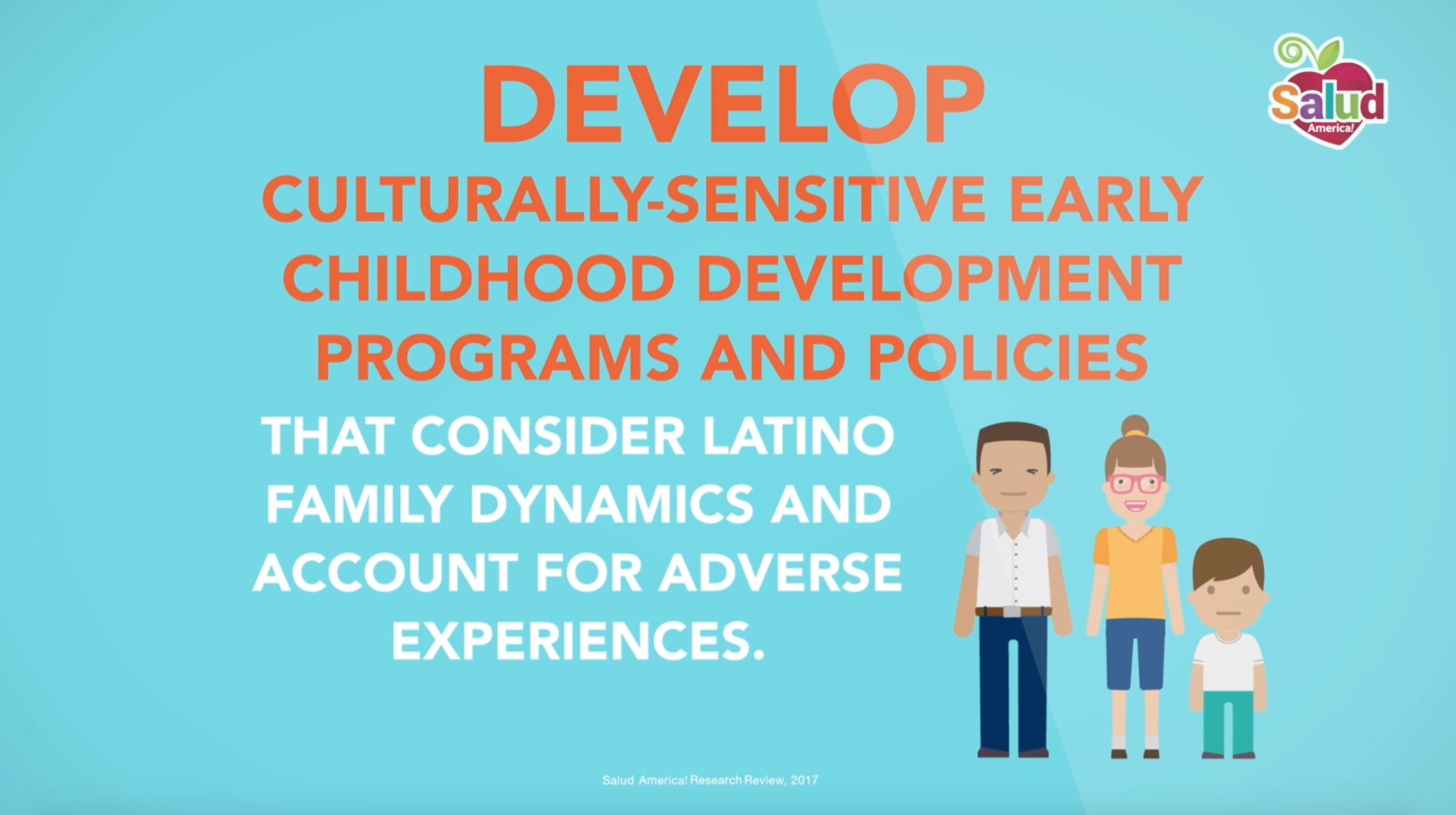
Share On Social!
This is part of the Salud America! The State of Latino Early Childhood Development: A Research Review »
Social and Emotional Skill-Building Starts in Families
Children begin to develop their social and emotional skills through initial interactions with family.
Through strong and consistent relationships, they learn the importance of social bonding, connecting to others with empathy, and self-regulating emotions.
Young children begin to learn about complex social interactions by receiving responsive caregiving from parents, which often leads to positive outcomes later in life.
Latino Kids’ Social and Emotional Health & Family Values
One study (N = 7,750; 19% Latino) found that although Latino children may demonstrate cognitive gaps compared with white children after age 1, their social-emotional health rivals that of white children, even when raised in lower-income families.1
 These findings suggest that social and emotional health of Latinos develops on an independent pathway.
These findings suggest that social and emotional health of Latinos develops on an independent pathway.
One potential reason is the parenting style among Latina mothers, which can be characterized as warm and nurturing. Latina mothers are typically very responsive to their children, and report fewer depressive symptoms than white mothers, which could be allowing for stronger connectedness with their children.
Common values can be found among most Latino families.
- The concept of family, or familismo, is extremely important to many Latinos. Family needs come before individual needs, and this is evident in Latinos’ desire to center many activities around the extended family.138 Due to economic circumstances, Latino households may be large and include members of the extended family, which can be stressful in some cases and helpful in others, especially regarding childrearing.
- Traditional gender roles, machismo and marianismo, are often practiced in Latino families, especially in low-income families.139,140 Machismo refers to the idea that the father is the head of the household, strong protector, and authority figure, whereas marianismo means the mother is self-sacrificing, religious and responsible for raising the children and maintaining the house.141
- Religion is also a cornerstone of the family and influences many beliefs and decisions within the family.142 Most Latinos in the U.S. practice Catholicism, but practices within that faith may differ depending on the country of origin.143 Because religion has been a part of Latino culture for so long, religious beliefs are difficult to separate from cultural values and often guide Latinos in many areas of life, even if they are not practicing religion.142
Many of these common qualities of Latino families—strong familial bonds, religious and cultural values, protective fathers and nurturing mothers—are beneficial for the development of Latino children and should be considered in early childhood education and development programs.
Educators and community organizations should target programs to the entire family, including the extended family when feasible, and to mothers as caregivers and fathers as important decision-makers.
Coordination with local religious institutions is also important to ensure that religious beliefs and cultural values are considered in program development.144,145
More from our The State of Latino Early Childhood Development: A Research Review »
- Introduction & Methods
- Key Research Finding: Latino Childhood Trauma
- Key Research Finding: Healthy Lifestyles
- Key Research Finding: Early Care and Education
- Key Research Finding: Strategy—Improve Early Care
- Key Research Finding: Strategy—Boost School Readiness
- Key Research Finding: Strategy—Reduce Childhood Trauma
- Key Research Finding: Strategy—Incorporate Family Values
- Key Research Finding: Strategy—Support Moms
- Policy Implications
- Future Research Needs
References for this section »
1. Guerrero, A. D. et al. Early Growth of Mexican–American Children: Lagging in Preliteracy Skills but not Social Development. Matern. Child Health J. 17, 1701–1711 (2013).
138. Smith-Morris, C., Morales-Campos, D., Alvarez, E. A. C. & Turner, M. An anthropology of familismo: On narratives and description of Mexican/immigrants. Hisp. J. Behav. Sci. 35, 35–60 (2013).
139. Prelow, H. M., Loukas, A. & Jordan-Green, L. Socioenvironmental Risk and Adjustment in Latino Youth: The Mediating Effects of Family Processes and Social Competence. J. Youth Adolesc. 36, 465–476 (2007).
140. Villegas, J., Lemanski, J. & Valdéz, C. Marianismo and Machismo: The Portrayal of Females in Mexican TV Commercials. J. Int. Consum. Mark. 22, 327–346 (2010).
141. Paludi, M. A. Praeger Guide to the Psychology of Gender. (Greenwood Publishing Group, 2004).
142. Gallo, L. C., Penedo, F. J., Espinosa de los Monteros, K. & Arguelles, W. Resiliency in the Face of Disadvantage: Do Hispanic Cultural Characteristics Protect Health Outcomes? J. Pers. 77, 1707–1746 (2009).
143. Espinosa, G., Elizondo, V. & Miranda, J. Hispanic Churches in American Public Life: Summary of Findings. (University of Notre Dame Institute for Latino Studies, 2003).
144. Skogrand, L., Hatch, D. & Singh, A. Understanding Latino families, implications for family education. (Utah State University, Extension, 2005).
145. Turner, K., Wildsmith, E. & Alvira-Hammond, M. Households of Low-Income Hispanic Children: Composition and Economic Circumstances. in (Appam, 2016).
Explore More:
Healthy Families & SchoolsBy The Numbers
142
Percent
Expected rise in Latino cancer cases in coming years



